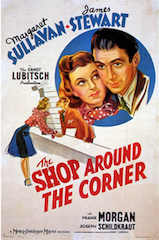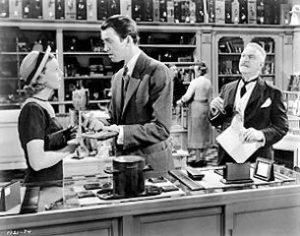 Ernst Lubitsch’s 1940 film The Shop Around the Corner is a familiar story for many reasons—one being that it is a textbook romantic comedy. The film is “textbook” not because it is a repetition of what came before, but because it helped set the precedent for what came after. The structure, the pacing, the timing, the comedic beats, the banter, and let’s not forget the superb acting by leading man James Stewart and leading lady Margaret Sullavan—all of these knit together beautifully and (dare I say) perfectly to make a seminal and utterly charming romantic comedy.
Ernst Lubitsch’s 1940 film The Shop Around the Corner is a familiar story for many reasons—one being that it is a textbook romantic comedy. The film is “textbook” not because it is a repetition of what came before, but because it helped set the precedent for what came after. The structure, the pacing, the timing, the comedic beats, the banter, and let’s not forget the superb acting by leading man James Stewart and leading lady Margaret Sullavan—all of these knit together beautifully and (dare I say) perfectly to make a seminal and utterly charming romantic comedy.
The story of Shop centers on the lives of the employees of a small shop, Matuschek & Company, in late-Depression-era Budapest, Hungary. The manager, Hugo Matuschek (played by Frank Morgan), and the employees have a (mostly) friendly and family-like dynamic. Alfred Kralik (Stewart) is the golden boy of the shop, and he has his best friend Pirovitch (Felix Bressart) by his side. But when a new employee, Klara Novak (Sullavan), joins the team, a Shakespearean comedy of errors ensues. Misunderstandings and misconceptions abound, which result in lighting-fast banter and delightful comedic beats (Bressart’s delivery and timing are perfection).
It was writer/director/producers like Lubitsch, Howard Hawks, and Frank Capra who set the standard for so many things we still love about film today. Shop Around the Corner is a great example. Case in point: the film was remade with Tom Hanks and Meg Ryan in 1998 as You’ve Got Mail. (The story of Shop has actually been through several iterations on the page and on the stage, in addition to the film adaptations).
Technical cinematic perfections aside, as I considered what the takeaway from this keystone romantic comedy might be, it seemed to come down to one word: loving-kindness. Most—if not all—of the conflict in Shop Around the Corner would have been avoided if the characters had treated one another with loving-kindness throughout the story, rather than waiting to mend what was broken. (Of course, without conflict, there is no story—but hey, it’s a takeaway, not a plot suggestion). As Christians, loving-kindness should be a defining characteristic of how we live and how we interact with the people around us. I Corinthians 13:4 says: “Love is patient, love is kind.” And in Galatians 5:22-23: “But the fruit of the Spirit is love, joy, peace, patience, kindness, goodness, faithfulness, gentleness, and self-control.”
 If Klara had simply treated Kralik with genuine friendship, rather than playing games and acting combative and aloof, he would have better understood her feelings for him at the beginning. If Kralik had not sunk to Klara’s level (or what he perceived it to be) and treated her with patience and kindness instead, she would likely have reciprocated and dropped the act. If Matuschek had treated Kralik as his friend and approached him with honesty and kindness, rather than becoming irrationally suspicious of him, Matuschek would not have accused, mistreated, and fired the wrong man—and then would not have had mend fences after the fact.
If Klara had simply treated Kralik with genuine friendship, rather than playing games and acting combative and aloof, he would have better understood her feelings for him at the beginning. If Kralik had not sunk to Klara’s level (or what he perceived it to be) and treated her with patience and kindness instead, she would likely have reciprocated and dropped the act. If Matuschek had treated Kralik as his friend and approached him with honesty and kindness, rather than becoming irrationally suspicious of him, Matuschek would not have accused, mistreated, and fired the wrong man—and then would not have had mend fences after the fact.
One last thing: there is a reason I chose this particular classic film to discuss just a few days before Christmas. Shop Around the Corner is as much of a Christmas movie as It’s a Wonderful Life—if the qualification is that the final scene takes place at Christmastime. It does. And it’s wonderful. The final scene of Shop takes place in and outside the shop on a charming, snowy street on Christmas Eve. Not only do we see our head-over-heels-in-love leading man and woman finally get together, but all of the characters—even the depressed, the lonely, and the new kid on the block—have someone to spend Christmas with. In short, the characters end by treating one another with loving-kindness, and the resulting warm fuzzies are perfect for the Christmas season.
Merry Christmas!



This isn’t really a genre I like, but I watched it along with the Canon-nominated Love Actually, which was sufficient to show that I dislike the latter for specific reasons rather than simply because of its genre. Shop Around the Corner is a well-executed movie which has aged much better.